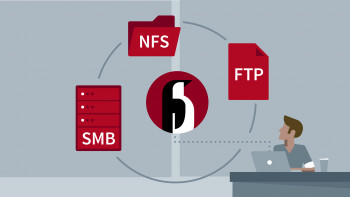FreeBSD Apache Jail Connection refused connect to listener failed
This article covers how to fix 'FreeBSD Apache Jail: Connection refused' issue for our customers.
While running Apache 2 server under FreeBSD jail, you may see a warning error messages in /var/log/httpd-error.log as follows:
[warn] (61)Connection refused: connect to listener on 0.0.0.0:80
To resolve this FreeBSD Apache Jail error:
1. You need to always set your actual, real IP. Open httpd.conf
# vi /usr/local/etc/apache22/httpd.conf
2. Find out Listen directive:
#Listen 12.34.56.78:80
Listen directive allows you to bind Apache to specific IP addresses and/or ports, instead of the default.
Change this to Listen on specific IP addresses as shown below to prevent Apache from glomming onto all bound IP addresses i.e. 0.0.0.0 which is not available in jail
3. Save and close the file. Restart apache:
# /usr/local/etc/rc.d/apache22 restart
No guest machines present libvirtd - Fix it now
This article covers how to troubleshoot and fix No guest machines present libvirtd for our customers.
The virsh program is the main interface for managing virsh guest domains. The program can be used to create, pause, and shutdown domains.
It can also be used to list current domains. Libvirt is a C toolkit to interact with the virtualization capabilities of recent versions of Linux (and other OSes).
The libvirt daemon is successfully started, but no guest virtual machines appear to be present.
There are various possible causes of this problem.
Performing these tests will help to determine the cause of this situation:
1. Verify KVM kernel modules
Verify that KVM kernel modules are inserted in the kernel:
$ lsmod | grep kvm
If you are using an AMD machine, verify the kvm_amd kernel modules are inserted in the kernel instead, using the similar command lsmod | grep kvm_amd in the root shell.
If the modules are not present, insert them using the modprobe <modulename> command.
Note: Although it is uncommon, KVM virtualization support may be compiled into the kernel. In this case, modules are not needed.
2. Verify virtualization extensions
Verify that virtualization extensions are supported and enabled on the host:
# egrep "(vmx|svm)" /proc/cpuinfo
Enable virtualization extensions in your hardware's firmware configuration within the BIOS setup.
3. Verify client URI configuration
Verify that the URI of the client is configured as desired:
# virsh uri
How to fix No guest machines present #libvirtd #error:
After performing these tests, use the following command to view a list of guest virtual machines:
# virsh list --all
Benefits of Data Warehouse in Business Organization
This article covers the Advantages of Data Warehouse.
#Data #warehousing improves the speed and efficiency of accessing different data sets and makes it easier for corporate decision-makers to derive insights that will guide the business and marketing strategies that set them apart from their competitors. Improve their bottom line.
Unlike a database, which is focused on users inputting data, a data warehouse is architected for decision-making, ad hoc queries and analytics. Thus, enabling queries to be performed without any impact to your company's operational database.
A data warehouse is a type of data management system that is designed to enable and support business intelligence (BI) activities, especially analytics. Data warehouses are solely intended to perform queries and analysis and often contain large amounts of historical data.
A data warehouse can help support business needs, such as the ability to consolidate financial results within a complex company that uses different software for different divisions.
Benefits of a Data Warehouse:
1. Delivers enhanced business intelligence.
2. Saves times.
3. Enhances data quality and consistency.
4. Generates a high Return on Investment (ROI).
5. Provides competitive advantage.
6. Improves the decision-making process.
7. Enables organizations to forecast with confidence.
8. Streamlines the flow of information.
The key characteristics of a data warehouse are as follows:
1. Some data is denormalized for simplification and to improve performance.
2. Large amounts of historical data are used.
3. Queries often retrieve large amounts of data.
4. Both planned and ad hoc queries are common.
5. The data load is controlled.
A data warehouse is subject oriented because it provides information around a subject rather than the organization's ongoing operations.
Data warehouses will help you make better, more informed decisions for many reasons, including:
1. Improved business intelligence
2. When you integrate multiple sources, you make decisions based on ALL of your data.
3. Timely access to data: Quickly access critical data in one centralized location.
libvirtd failed to start - Fix it Now
This article covers how to resolve the error 'libvirtd failed to start' which happens while manually trying to start libvirt daemon.
To resolve this #libvirtd #error, Try journalctl -u libvirtd.service and see if the full log for the service has more information.
You can manually install "libxslt" to resolve the problem.
Also you can try re-installing the packages that libvirtd/KVM requires and did a full system update.
After that, reboot the server, and libvirtd.service will be working fine.
Importance of Database Testing
This article covers the importance of database testing. Database Testing is Important in software testing because it ensures data values and information received and stored into database are valid or not. Database testing helps to save data loss, saves aborted transaction data and no unauthorized access to the information.
A database is typically designed so that it is easy to store and access information.
A good database is crucial to any company or organization. This is because the database stores all the pertinent details about the company such as employee records, transactional records, salary details and so on.
Why do we do database #testing?
Database Testing is a type of software testing that checks the schema, tables, triggers etc. of the database under test.
It involves creating complex queries for performing the load or stress test on the database and check its responsiveness.
It checks integrity and consistency of data.
Why do we need database security?
Safeguarding the data your company collects and manages is of utmost importance. Database security can guard against a compromise of your database, which can lead to financial loss, reputation damage, consumer confidence disintegration, brand erosion, and non-compliance of government and industry regulation.
#Database #Security Best Practices includes:
1. Separate database servers and web servers.
2. Use web application and database firewalls.
3. Secure database user access.
4. Regularly update your operating system and patches.
5. Audit and continuously monitor database activity.
6. Test your database security.
7. Encrypt data and backups.
NFS vs SMB - Which is better
This article will guide you on the comparison between NFS and SBM performance.
NFS vs. SMB comparison.
Server Messaging protocol (SMB) is the native file sharing protocol implemented in Windows systems.
The Network File System (#NFS) protocol is used by Linux systems to share files and folders.
NFS, or Network File System, was designed in 1984 by Sun Microsystems. This distributed file system protocol allows a user on a client computer to access files over a network in the same way they would access a local storage file. Because it is an open standard, anyone can implement the protocol.
The Server Message Block Protocol (#SMB protocol) is a client-server communication protocol used for sharing access to files, printers, serial ports and other resources on a network. It can also carry transaction protocols for interprocess communication.














